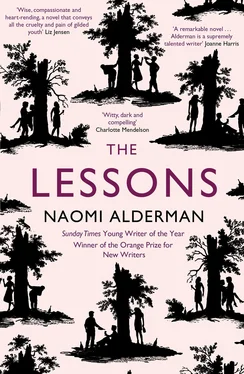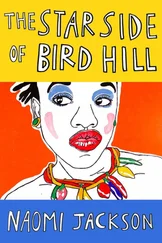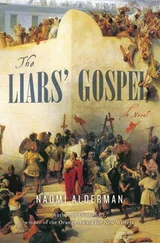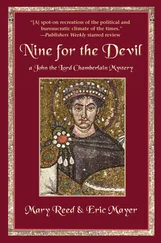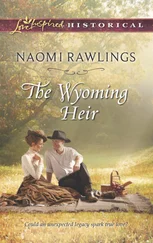‘It’s called road safety, Mark. You should try it.’
‘No,’ he said, ‘I don’t think that’s it.’
‘OK, Mark, you tell me. Why?’
He pursed his lips.
‘I think,’ he said, ‘I think it’s because you like to let people get away from you. You know. You don’t like being chased, you like to be the one who pursues. But you can’t pursue too hard, or they’ll realize you’re interested. So you’re always tagging along behind people, slowly letting them get away.’
My voice became very level, very tight. I said, ‘I have never heard anything so incredibly, pathetically stupid . Do you honestly think that you can derive some cod-psychological truths about me from the way that I drive? And after the performance you have just given, which fucking one of us do you really think has the problem, Mark? How can you think you have any right to lecture me about my personality?’
He looked at me, smiling. ‘It’s true though, isn’t it? I expect that’s what Father Hugh wanted to tell you too.’ He looked back at the road, spun the wheel in his hands and turned the Dino into the pub car park.
11 Second year, May, fifth week of term
When did I begin to be afraid to answer the telephone? Here in San Ceterino we have an answerphone set so that the phones barely ring before Mark’s recorded voice requests, drily, that a message be left. When Mark isn’t at home I hover by the machine, listening to the call, my hands by my sides, gauging my own response to the idea of speaking to them. Often it’s a friend of Mark’s from the village, less often a member of his family or one of their financial representatives, least often my parents or Anne telling me a piece of family news in their small, bitter voices. I listen to the recording being made; I stand waiting until the person hangs up. I allow the messages to accumulate, then I delete them. Mark is different: he either picks up the phone impulsively, surprised if the person on the other end isn’t entirely delightful, or fails to listen to the messages at all. But then, it’s not Mark who’s had to receive the calls about him and the things he has done over the years. It’s not Mark who’s had to decide what to do about them.
There is this to be said for Mark: he never, despite all his wealth and connections, showed the slightest interest in joining the ranks to which that wealth and those connections would have given him instant access. He never cared to attend drinks with the Master of his college, although he was invited with great frequency. He never took sherry with Bill Clinton at Rhodes House, though he received an embossed invitation, hand-delivered. He certainly never belonged to one of those exclusive all-male dining societies which still blight the face of Oxford, although he did once list for us in alphabetical order all the members of the Bullingdon Club he’d ever shagged or snogged. And when Franny angrily informed us that some male members of the Jewish Society, in a depressing attempt to introduce the same misogynist practices as the rest of Oxford to that institution, had formed an all-male dining society, Mark’s only comment was, ‘My darling, I guarantee you that each and every one of them will meet a bad end. I shall personally see to it if you like.’
It was in that light that he was critical of Father Hugh. The monk was a visitor to the house two or three times in the summer of our second year, always on the pretext that he had ‘happened past’ and never staying for too long. He never gave the slightest indication that he and I had spoken privately except that, when he made his goodbyes his handshake with me might have lingered a little longer, and his invitation, ‘I do hope to see you at the hall,’ might have been made to me with a more fixed gaze.
‘He’s a horrible snob,’ said Mark to us after one of these visits. ‘He’s only interested in bringing on the boys from the good families. He loves nothing better than getting invited to the House of Lords. As if I spoke to any of those people.’
Father Hugh did not attempt to contact me again that term. It was left to me to contact him and I did not, at first, think I would have any reason to do so.
The notorious ‘fifth week blues’ had struck; the day was cold, grey and melancholy. Jess was working and Emmanuella was still in bed — she often stayed in bed all day if the weather was cold, huddled up in a fur coat, reading and sipping hot chocolate.
I was in the kitchen, the warmest part of the house, flicking through the paper and putting off minute by minute the moment when I would have to return to my work, when the telephone rang. I answered it.
‘James?’ It was Mark. ‘James,’ he said, ‘you have to come. I’ve been arrested.’
‘What?’ I said. ‘I mean, why? What have you done? What’s happened?’ And I thought the worst, it must be the very worst, after all he had done. When he did not answer, I said, ‘Is someone hurt, Mark? Have you … is someone hurt?’
He breathed in and breathed out and said airily, ‘Oh, James. You do make a performance out of a drama. It’s just cottaging. Come down and bring me a change of clothes. I’ve been here all night. Hurry up please, they only gave me 20p.’
I can’t say why I did what I did next. Only perhaps that I was afraid, or felt that something was promised. I pulled Isabella’s card from my wallet. I turned it over. On the back, Father Hugh had written his private Oxford number. After a little consideration, I dialled.
‘Benet’s?’ said the voice on the other end.
‘Oh,’ I said, ‘I was hoping to speak to Father Hugh.’
The porter sighed and I heard the sound of papers turning.
‘He’s out,’ the porter said at last.
‘Can I leave a message?’
Another sigh.
‘Could you tell him that James rang? James Stieff? It’s about Mark. He’s at the police station because …’ I stopped. What was I going to say to this porter? I couldn’t tell him the whole business, ridiculous. ‘Actually,’ I said, ‘never mind. Don’t worry about it. I’ll speak to him another time. Sorry to trouble you.’
A final lingering sigh.
‘That’s it then?’ said the porter.
‘Yes,’ I said, ‘thanks.’
It was by no means as bad as it could have been. By the time Jess, Emmanuella and I arrived at the police station most of the formalities had already been dealt with. Mark had been questioned but not charged. Police bail was to be arranged.
We met him in a waiting room. He looked dishevelled and exhausted. I handed him the carrier bag of clothes I’d taken from his bedroom. He nodded and attempted a half-smile. This was not the bravado I’d heard in his voice when he called. This Mark, saddened if not chastened, was surprising to me.
I was even more startled when Emmanuella asked, in a cool voice, ‘Did you use condoms?’
Mark nodded. Jess and I exchanged a quick look. We had expected more naivety from her, and more judgement.
Emmanuella looked at him, then pulled out a cigarette and offered him one too. ‘Still,’ she said, ‘you must be tested for … SIDA — how do you say that?’
‘AIDS,’ said Mark. ‘And I don’t have it. I was tested a couple of months ago.’
I stared at the floor. It seemed impossible, but there was graffiti there — someone had drawn a penis pointing towards the table in indelible black marker. I found that I profoundly did not want to be contemplating Mark’s sex life. It wasn’t that I was disgusted by it, although I had never found the idea in any way alluring, but I found this image sordid. Anonymous encounters and prison cells and AIDS tests. I thought of the comfort and companionship of my life with Jess, of our cosy bed with its clean white sheets and patchwork counterpane. I felt a shred of sympathy for Father Hugh’s opinion. Where were all Mark’s lovers now?
Читать дальше
